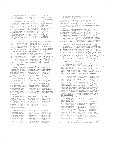 Jwindz referrer k~ in retrospect in 'On the
Jwindz referrer k~ in retrospect in 'On the
Sand Planet.' Certainly the true men of the
cities appear to be rather inhuman and ascetic
'Scanners Live in vain' represents a period of renascence, when mankind is emerging from its Dark Ages, but is still very conscious of evils of the past. The Instrumentality keeps the peace within worlds, and the Scanners between them. Mankind has ventured into space again, and evidently colonized the solar system. Vitality has returned to the cities - but the Wild still lurks outside them, and electronic fields yet serve the function of castle walls of the Middle Ages.
Still later, in 'The Lady Who Sailed the Soul', humanity has regained a civilization much like our own, save that it is worldwide, even system-like, free of the national and political revalries of our own age ~ thanks to the benevolent rule of the Instrumentality.
It is an age of affluence and luxury - but an age of daring and high adventure. Mankind has been united, but far from homogenized. Nationalities still exist, if not the nations they once represented; there are competing fashions, fads, and movements. But already, a certain decadence is beginning to set in on Old Earth, and the romantics seek freedom among the stars.
The discovery of stroon, first referred to in 'When the People Fell' accelerates this trend. So does the later invention of plano-forming, which makes interstellar travel a matter of hours rather than years. Four thousand years after the beginning of the second Space Age, in 'From Gustible's Planet', we see an interstellar society thoroughly decadent and corrupt.
True men live in idlenessI but for those who are "programmed" for a few professions, and a handful of pinlighters, Go-Captains and similar free spirits. Underpeople and robots with animal brains do most of the real work. All cultural differences are gone on the worlds controlled by the Instrumentality even news and history are banned. Mankind has been subjected to a benevolent - but stifling utopia.
Beginning with 'The Dead Lady of Clown Town', there is a revolt against this false Utopia, involving both the underpeople and believers in the Old Strong Religion. This revolution reaches its climax in the Rediscovery of Man, which brings back the old cultures and even the old evils to make life worthwhile again.
The revolution is a gradual one, aimed at changing the values of a whole society over a period of generations, rather than trying to overthrow the established order. The end result is not clear, for Dr. Linebarger never completed his epic, but it is implied that thc. true men and the underpeople eventually ;each a position of equality and mutual respect -and confront some sort of common destiny that
- IS-
equates the Christian apocalypse with
Stapledon's Surpreme Moment of the Cosmos.
There are several common threads running through Smith's epic of social evolution. The first and most obvious of these, of course, is the role of the Instrumentality of Mankind itself.
It may be significant that the word "Instrumentality,, has both a political and a theological definition. AS politically defined, an instrumentality is an agency of government empowered to carry out some function. Theologically, an instrumentality is an agency of the Divine power - the Mass and the priest celebrating it, for example, are both seen as instrumentalities of God.
The Instrumentality of Mankind is not religious, yet it expresses a conviction of inspired purpose similar to that of religion. As Mrs. Linebarger has expressed it, the mystique of the Instrumentality in the Smith epic is "neither Communismt or religion, but some common denominator of both." The Lords of the Instrumentality are not mere politicians or bureaucrats - though they perform such functions. Rather they are visionaries, imbued with a sense of mission in regard to the future of mankind.
At first, this mission seems to have been limited to protection of mankind from war.
In 'Drunkboat' we learn that the Instrumentality "emerged from the Ancient Wars" with the "perpetual slogan" of "Watch, but do not govern; stop war, but do not wage it; protect but do not control; and first, survive:"
The almost-unlimited power granted each Lord, and the use of both inheritance and recruitment (Lord Jestocost vs. Lord Roderick Eleanor) to ensure that only the most vigorous minds are entrusted to carry out this mission show how seriously the Instrumentality takes itself. Even such policies as bribery of its own members to weed out the unfit show the obsession of this elite of prime movers with staying in power. All possible methods are used to ensure that the Instrumentality can never be overthrown - and thus never fail in its mission to mankind.
Significant too is the fact that the Instrumentality appears not to be a government in itself, but rather something over and above the government. References like "The Earth Government and the Instrumentality" (in 'Under Old Earth") suggest it holds a position analogous to that of the Communist party in Communist countries. The role it plays towards the Goonhogo in 'When the People Fell' towards the Old North Australia government in 'The Planet Buyer', and towards many planetary governments in the Casher O'Neill stories, reinforces this impression.
Still, it is only during a relatively late period, after that in 'The Burning of the
Document scaning and conversion provided by Peter Barker
Updated May 12, 2015. If you have a comment about these web pages please send a note to the Fanac Webmaster. Thank you.